|
|
|
Sort Order |
|
|
|
Items / Page
|
|
|
|
|
|
|
| Srl | Item |
| 1 |
ID:
086335
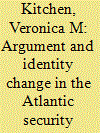

|
|
|
|
|
| Publication |
2009.
|
| Summary/Abstract |
The Atlantic community shares more than just dependable expectations of peaceful change. Its members also share a reflexive political community they sense is worth preserving and a view that their security is intertwined. Existing accounts of the Atlantic security community have identified the importance of renewed emphasis on common values as a factor in preserving and expanding the security community after the Cold War. But, debates at the end of the Cold War also turned on the question of what the allies would do together and what responsibilities they had to each other and to other states. This article outlines a discursive framework and a set of rhetorical strategies used by members of the Atlantic community that explain how they worked to maintain and change their community during debates about their mandate for cooperation. This framework is then applied to the Atlantic community's debates over common action during the Yugoslav wars.
|
|
|
|
|
|
|
|
|
|
|
|
|
|
|
|
| 2 |
ID:
073205
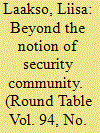

|
|
|
| 3 |
ID:
064497
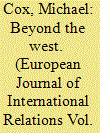

|
|
|
| 4 |
ID:
092039
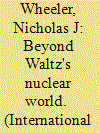

|
|
|
|
|
| Publication |
2009.
|
| Summary/Abstract |
In 1981 Kenneth Waltz published a controversial Adelphi Paper, 'The Spread of Nuclear Weapons: More May Be Better', in which he turned the conventional wisdom on its head by arguing that the spread of nuclear weapons would not be a terrifying prospect. This article rejects the proposition that fear of nuclear destruction can serve as a permanent basis of international order, and argues that securing order depends upon the building of trust between nuclear-armed and arming powers. A key contribution here has been the theory and practice of security communities, which opens up the promise of replacing nuclear threats by a new international politics in which force has been delegitimated as an instrument of state policy. This article discusses the potential for nuclear trust-building through the example of the security community that developed between Argentina and Brazil in the 1980s. Both countries had the potential to develop nuclear weapons by the end of the 1970s, and there were concerns that their rivalry might lead to a regional nuclear arms race. Having explored the factors that promoted trust between Buenos Aires and Brasilia, the article considers the lessons that can be learned for nuclear trust-building elsewhere.
|
|
|
|
|
|
|
|
|
|
|
|
|
|
|
|
| 5 |
ID:
103194
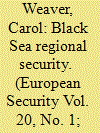

|
|
|
|
|
| Publication |
2011.
|
| Summary/Abstract |
Three theories that can be usefully employed to analyse the security of the Black Sea region are structural realism, security communities and supranationality (based on the European Union (EU) model). Given that the Black Sea area currently has too many conflicts and rivalries to be a truly cooperative region or a 'security community', we must examine its dynamics in terms of its present realism, especially in the east of the region ('what is'), as well as considering its future ('what could be'). Regionalisation and Europeanisation are both possibilities for the longer term but, for the development of a fully cooperative region, possibly based on the EU model, it is posited that a condition of 'balanced multipolarity' must initially exist. The paper analyses the extent to which this type of polarity applies at the moment and then uses all the theories to outline possible ways forward for the region.
|
|
|
|
|
|
|
|
|
|
|
|
|
|
|
|
| 6 |
ID:
160615
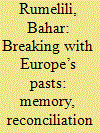

|
|
|
|
|
| Summary/Abstract |
The European Union is widely credited for consolidating a democratic “security community” in Europe, and bringing about a definitive break with war-torn and authoritarian/totalitarian pasts in many European countries. Drawing on recent discussions in ontological security studies, this article points out that these radical breaks may have come at the expense of ontological insecurity at the societal and individual levels in Europe. While conventional teleological narratives often treat reconciliation and breaking with the past as automatic by-products of European integration, ontological security theory calls for greater attention to the societal tensions and anxieties triggered by these transformations and how they are being managed –more or less successfully – through reconciliation dynamics and memory politics in different societal settings. Illustrating the variation in a number of cases, this article claims that a systematic comparative analysis of the different dynamics of reconciliation and memory politics in different European societies is central to analyzing European integration from an ontological security perspective.
|
|
|
|
|
|
|
|
|
|
|
|
|
|
|
|
| 7 |
ID:
132332
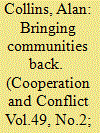

|
|
|
|
|
| Publication |
2014.
|
| Summary/Abstract |
The Association of Southeast Asian Nations (ASEAN) is building a people-oriented community in Southeast Asia and it has all the hallmarks of a Deutschian security community, with its emphasis on people-to-people contact and the involvement of civil society organisations in the community's creation. In this article the argument is made that it is precisely the involvement of the masses that creates the peace inertia associated with security communities, and thus ASEAN's plural turn is an essential first step in making ASEAN's community a security community. Whether ASEAN can actually do this, and indeed whether the membership are united in this objective, is not the focus for this article. Instead, and contrary to the security community literature, which identifies ASEAN as a non-liberal security community and has emphasised the practice of self-restraint, this article argues that past ASEAN practice has prevented a security community forming in Southeast Asia, and using self-restraint as an explanation for why security communities create dependable expectations of peaceful change for members has resulted in the agency of 'community' being neglected. Hence, this article argues for the need to bring 'community' back.
|
|
|
|
|
|
|
|
|
|
|
|
|
|
|
|
| 8 |
ID:
069086
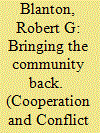

|
|
|
| 9 |
ID:
118776
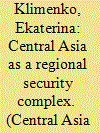

|
|
|
| 10 |
ID:
133093
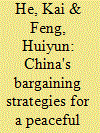

|
|
|
|
|
| Publication |
2014.
|
| Summary/Abstract |
Applying bargaining theory of international conflicts, we examine the successes and challenges of China's strategic choices in its ascent after the Cold War. We suggest that China needs to alleviate information and commitment problems in order to rise peacefully. Since 2008, China's "peaceful rise" strategy has faced serious challenges because of its "assertive turn" in diplomacy. We argue that China has not alleviated or settled these two problems successfully because of its ambiguous "core interest" diplomacy and undecided attitude regarding multilateral institutions in resolving the maritime disputes. China should engage in rule-based, institution building, such as a security community between China and ASEAN, to reinforce its peaceful rise commitments.
|
|
|
|
|
|
|
|
|
|
|
|
|
|
|
|
| 11 |
ID:
153234
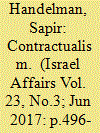

|
|
|
|
|
| Summary/Abstract |
How do we create an effective change in situations of intractable conflict where ordinary people are at the centre of the struggle? Distinguishing between top-down contractualism and bottom-up contractualism, this article presents the South African peace process of the 1990s as an example of top-down contractualism. In contrast, it raises the question as to whether bottom-up peace-making contractualism can emerge in the Israeli–Palestinian case.
|
|
|
|
|
|
|
|
|
|
|
|
|
|
|
|
| 12 |
ID:
116195
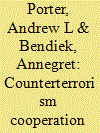

|
|
|
|
|
| Publication |
2012.
|
| Summary/Abstract |
While the notion of a European security community encounters little resistance in the security community literature, the transatlantic security community, comprised of the European Union (EU) and United States of America (USA), has suffered routine criticism in the aftermath of 9/11. This article seeks to lend empirical support to the claim that the transatlantic security community is alive and well, though not without its political arrhythmias. Drawing on the idea that community membership enhances norm convergence, this article examines the process of norm convergence in EU-US counterterrorism cooperation. We argue that the recent EU-US agreements on Passenger Name Records and the Terrorist Finance Tracking Programme represent a form of cooperation, that is, the convergence of values, which is essential for late-stage security community integration. Detainee practices, however, represent a harder case for the transatlantic security community. Despite these difficulties, we argue that this controversy does not preclude a priori the possibility of agreement. Although these transatlantic differences might shake the foundations of the EU security community, we argue that the current controversies provide an opportunity for the EU to reaffirm its commitment to its values, thus reinforcing its foundations as an independent security community. This account of cooperation, political disagreement notwithstanding, upsets the Kaganian account of transatlantic relations.
|
|
|
|
|
|
|
|
|
|
|
|
|
|
|
|
| 13 |
ID:
189660
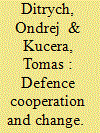

|
|
|
|
|
| Summary/Abstract |
This article situates recent initiatives to deepen security and defence cooperation in the European Union in the historical perspective. It proposes a model of constitutive relationship between the process of change in a security community and the formation of a transnational defence industry community of practice which yields positive feedback (‘productive returns’) to the security community as a broader assemblage within which it was constituted. This model is applied to the paradigmatic case of European security community that formed after the World War II (WWII). The analysis shows that the key driver for defence integration traced by means of social network analysis (SNA) in this case was economic rather than political, and for an extended period of time it developed without formal institutions. The productive return of the ‘defence industry machine’ as a distinct community of practice that was constituted through the integration process consisted in the sense of deeper belonging and a shared sense of working well together in a traditionally highly nationalised defence milieu.
|
|
|
|
|
|
|
|
|
|
|
|
|
|
|
|
| 14 |
ID:
098464
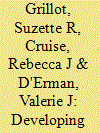

|
|
|
|
|
| Publication |
2010.
|
| Summary/Abstract |
This article examines how external third parties, particularly international organizations, can facilitate the development of security community and international integration within post-conflict societies. Focusing on seven countries in the Western Balkan region, this study offers unique insight into how and why feelings of trust and a sense of community can be encouraged by external actors - the EU and NATO in this case - and how and if trust and community can filter down to the most local levels within post-conflict societies. Ultimately, we argue that both the EU and NATO have, primarily through membership requirements to engage in regional interaction and cooperation, significantly contributed to the development of security community among Western Balkan neighbors at the elite level. However, we also find that feelings of trust and belongingness are still very much lacking among the general population of the Western Balkan region. Such insights will further efforts to enhance conflict resolution and post-conflict reconstruction in the Western Balkans and elsewhere.
|
|
|
|
|
|
|
|
|
|
|
|
|
|
|
|
| 15 |
ID:
061675
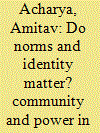

|
|
|
| 16 |
ID:
071782
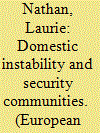

|
|
|
|
|
| Publication |
2006.
|
| Summary/Abstract |
The problem of political instability is neglected in the literature on security communities. In this article I argue that domestic stability, defined as the absence of large-scale violence in a country, is a necessary condition of these communities. Domestic violence precludes the existence of security communities because it renders people and states insecure; it creates the risk of cross-border destabilization and violence; and it generates uncertainty and tension among states, inhibiting trust and a sense of collective identity. I conclude that the benchmark of a security community-dependable expectations of peaceful change-should apply as much within states as between them. This is consistent with the work of Karl Deutsch, whose pioneering concept of a security community is widely understood to mean the absence of interstate war. Deutsch, in fact, was equally concerned with large-scale internal violence.
|
|
|
|
|
|
|
|
|
|
|
|
|
|
|
|
| 17 |
ID:
110844


|
|
|
|
|
| Publication |
2011.
|
| Summary/Abstract |
Recent world politics displays two seemingly contradictory trends: on the one hand, the incidence of international and even civil war shows a very great decline, but on the other hand the US, and to a lesser extent Britain and France, have been involved in many military adventures since the end of the Cold War. The causes are numerous, but among them is the unipolar structure of world politics, which presents the US with different kinds of threats and new opportunities. Central also is the existence of a security community among the leading states. A number of forces and events could undermine it, but they seem unlikely to occur. Even in this better world, however, recessed violence will still play a significant role, and force, like other forms of power, is most potent and useful when it remains far in the background.
|
|
|
|
|
|
|
|
|
|
|
|
|
|
|
|
| 18 |
ID:
153248
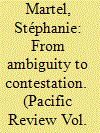

|
|
|
|
|
| Summary/Abstract |
‘Non-traditional security’ (NTS) is prominently featured in the agenda of the Association of Southeast Asian Nations (ASEAN) and other ASEAN-led institutions in the Asia-Pacific. ‘NTS’ brings together a series transnational and non-military security threats that are considered common among regional states, urgent for them to attend to, and non-sensitive all at the same time. This a priori makes it a self-evident focus of attempts to bring regional security cooperation ‘to a higher plane’. However, this paper reveals that the uncontroversial character of NTS is overestimated, by shedding light on the co-existence of divergent – and potentially contradictory – interpretations of its meaning and implications in ASEAN and the wider region. In a context where ASEAN's relevance to the pursuit of regional security is increasingly being measured against its (in)ability to provide a coherent approach to security challenges that affect the region, the contested nature of NTS has important implications for the grouping's resilience in the twenty-first century.
|
|
|
|
|
|
|
|
|
|
|
|
|
|
|
|
| 19 |
ID:
190668
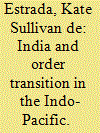

|
|
|
|
|
| Summary/Abstract |
Managing order transition in the Indo-Pacific is as much about negotiating the character of regional order as it is about mounting balance of power challenges or establishing countervailing institutional arrangements. For this reason, members of the Quad have expressed ambitions to deliver shared security on the basis of collective identity and values—though at times more in discourse than in practice. This article argues that India is actively contesting and, in some ways reconfiguring, the legitimating narratives of the Quad as an Indo-Pacific ‘security community’. Under the leadership of Narendra Modi, India has approached the socialising imperative of liberal identity cues selectively and ambivalently. More widely, India has declined to pursue an overt, collective strategy of Chinese containment and has propounded distinctive visions of regional security provision. India’s vision for liberal order in the Indo-Pacific stands apart from the ‘security community’ that the other Quad partners have enunciated in their foreign policy discourse, with consequences for the future of order transition in the Indo-Pacific.
|
|
|
|
|
|
|
|
|
|
|
|
|
|
|
|
| 20 |
ID:
116171


|
|
|
|
|
| Publication |
2012.
|
| Summary/Abstract |
We introduce the latest member of the intelligence family. Joining IMINT, HUMINT, SIGINT and others is 'SOCMINT' - social media intelligence. In an age of ubiquitous social media it is the responsibility of the security community to admit SOCMINT into the national intelligence framework, but only when two important tests are passed. First, that it rests on solid methodological bedrock of collection, evidence, verification, understanding and application. Second, that the moral hazard it entails can be legitimately managed. This article offers a framework for how this can be done.
|
|
|
|
|
|
|
|
|
|
|
|
|
|
|
|
|
|
|
|
|